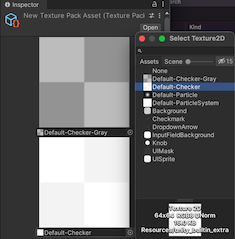在不使用 ListView 的情况下绑定到列表
版本: 2023.2+
您可以绑定到没有 ListView 的列表。为此,将每个元素绑定到序列化对象的数组中的一个项目,并跟踪数组大小的值。在某些情况下,数组大小可能会发生变化,例如撤消或重置操作。
此示例演示如何在不使用 ListView 的情况下绑定到列表。
示例概述
此示例创建了一个 TexturePreviewElements 列表,并将该列表绑定到 Texture2D 对象的基础列表。

您可以在此 GitHub 存储库 中找到此示例创建的完整文件。
先决条件
本指南适用于熟悉 Unity 编辑器、UI(用户界面) 允许用户与您的应用程序交互。Unity 目前支持三种 UI 系统。 更多信息
请参阅 术语表 工具包和 C# 脚本的开发人员。在开始之前,请熟悉以下内容
- 可视化树一个由轻量级节点组成的对象图,其中包含窗口或面板中的所有元素。它定义了您使用 UI 工具包构建的每个 UI。
请参阅 术语表 - UXML
BindProperty()TrackPropertyValueScrollView
创建包含列表的对象
创建一个包含列表的 C# 类。此列表是绑定的目标。
- 在 Unity 中使用任何模板创建一个项目。
- 在您的 项目窗口一个显示您的
Assets文件夹内容的窗口(项目选项卡) 更多信息
请参阅 术语表 中,创建一个名为bind-to-list-without-ListView的文件夹以存储所有文件。 - 创建一个名为
TexturePackAsset.cs的 C# 脚本,并将其内容替换为以下内容
using System.Collections.Generic;
using UnityEngine;
namespace UIToolkitExamples
{
[CreateAssetMenu(menuName = "UIToolkitExamples/TexturePackAsset")]
public class TexturePackAsset : ScriptableObject
{
public List<Texture2D> textures;
public void Reset()
{
textures = new() { null, null, null, null };
}
}
}
创建和设置自定义控件的样式
使用 C# 创建一个表示对 2D 纹理资产的引用的自定义控件,并使用 USS 设置其样式。
- 在该文件夹中,创建一个名为
Editor的文件夹。 - 在 Editor 文件夹中,创建一个名为
TexturePreviewElement.cs的 C# 脚本。 - 将
TexturePreviewElement.cs的内容替换为以下内容
using System;
using UnityEditor.UIElements;
using UnityEngine;
using UnityEngine.UIElements;
using Object = UnityEngine.Object;
namespace UIToolkitExamples
{
[UxmlElement]
public partial class TexturePreviewElement : BindableElement, INotifyValueChanged<Object>
{
public static readonly string ussClassName = "texture-preview-element";
Image m_Preview;
ObjectField m_ObjectField;
Texture2D m_Value;
public TexturePreviewElement()
{
AddToClassList(ussClassName);
// Create a preview image.
m_Preview = new Image();
Add(m_Preview);
// Create an ObjectField, set its object type, and register a callback when its value changes.
m_ObjectField = new ObjectField();
m_ObjectField.objectType = typeof(Texture2D);
m_ObjectField.RegisterValueChangedCallback(OnObjectFieldValueChanged);
Add(m_ObjectField);
styleSheets.Add(Resources.Load<StyleSheet>("texture_preview_element"));
}
void OnObjectFieldValueChanged(ChangeEvent<Object> evt)
{
value = evt.newValue;
}
public void SetValueWithoutNotify(Object newValue)
{
if (newValue == null || newValue is Texture2D)
{
// Update the preview Image and update the ObjectField.
m_Value = newValue as Texture2D;
m_Preview.image = m_Value;
// Notice that this line calls the ObjectField's SetValueWithoutNotify() method instead of just setting
// m_ObjectField.value. This is very important; you don't want m_ObjectField to send a ChangeEvent.
m_ObjectField.SetValueWithoutNotify(m_Value);
}
else throw new ArgumentException($"Expected object of type {typeof(Texture2D)}");
}
public Object value
{
get => m_Value;
// The setter is called when the user changes the value of the ObjectField, which calls
// OnObjectFieldValueChanged(), which calls this.
set
{
if (value == this.value)
return;
var previous = this.value;
SetValueWithoutNotify(value);
using (var evt = ChangeEvent<Object>.GetPooled(previous, value))
{
evt.target = this;
SendEvent(evt);
}
}
}
}
}
- 在 Editor 文件夹中,创建一个名为
Resources的文件夹。 - 在 Resources 文件夹中,创建一个名为
texture_preview_element.uss的样式表,并将其内容替换为以下内容
.texture-preview-element {
width: 200px;
height: 200px;
}
.texture-preview-element > .unity-image {
flex-grow: 1;
}
创建自定义编辑器并设置绑定
使用创建资产的 C# 脚本创建自定义编辑器。
要更改 UI 中 TexturePreviewElements 数量发生变化时纹理列表的大小,请调用 SetupList() 方法并遍历序列化列表中的条目列表。
要将每个 TexturePreviewElement 绑定到纹理列表,请使用 TexturePackAsset.textures 的属性名称调用 BindProperty()。
- 在 Editor 文件夹中,创建一个名为
TexturePackEditor.cs的 C# 脚本,并将其内容替换为以下内容
using UnityEditor;
using UnityEditor.UIElements;
using UnityEngine;
using UnityEngine.UIElements;
namespace UIToolkitExamples
{
[CustomEditor(typeof(TexturePackAsset))]
public class TexturePackEditor : Editor
{
[SerializeField]
VisualTreeAsset m_VisualTreeAsset;
public override VisualElement CreateInspectorGUI()
{
var editor = m_VisualTreeAsset.CloneTree();
var container = editor.Q(className: "preview-container");
SetupList(container);
// Watch the array size to handle the list being changed
var propertyForSize = serializedObject.FindProperty(nameof(TexturePackAsset.textures) + ".Array");
propertyForSize.Next(true); // Expand to obtain array size
editor.TrackPropertyValue(propertyForSize, prop => SetupList(container));
editor.Q<Button>("add-button").RegisterCallback<ClickEvent>(OnClick);
return editor;
}
void SetupList(VisualElement container)
{
var property = serializedObject.FindProperty(nameof(TexturePackAsset.textures) + ".Array");
var endProperty = property.GetEndProperty();
property.NextVisible(true); // Expand the first child.
var childIndex = 0;
// Iterate each property under the array and populate the container with preview elements
do
{
// Stop if we've reached the end of the array
if (SerializedProperty.EqualContents(property, endProperty))
break;
// Skip the array size property
if (property.propertyType == SerializedPropertyType.ArraySize)
continue;
TexturePreviewElement element;
// Find an existing element or create one
if (childIndex < container.childCount)
{
element = (TexturePreviewElement)container[childIndex];
}
else
{
element = new TexturePreviewElement();
container.Add(element);
}
element.BindProperty(property);
++childIndex;
}
while (property.NextVisible(false)); // Never expand children.
// Remove excess elements if the array is now smaller
while (childIndex < container.childCount)
{
container.RemoveAt(container.childCount - 1);
}
}
void OnClick(ClickEvent evt)
{
var property = serializedObject.FindProperty(nameof(TexturePackAsset.textures));
property.arraySize += 1;
serializedObject.ApplyModifiedProperties();
}
}
}
- 创建一个名为
texture_pack_editor.uxml的 UI 文档,并将其内容替换为以下内容
<ui:UXML xmlns:ui="UnityEngine.UIElements" xmlns:uie="UnityEditor.UIElements" xmlns="UnityEngine.UIElements" example="UIToolkitExamples" editor-extension-mode="True">
<ui:ScrollView>
<ui:VisualElement class="preview-container" style="flex-wrap: wrap; flex-direction: row; justify-content: space-around;" />
</ui:ScrollView>
<ui:Button name="add-button" text="Add" />
</ui:UXML>
- 在项目窗口中,选择 TexturePackEditor.cs。
- 将 texture_pack_editor.uxml 拖到 检查器一个 Unity 窗口,显示有关当前选定的 GameObject、资产或项目设置的信息,允许您检查和编辑值。 更多信息
请参阅 术语表 中的 可视化树资产。
测试绑定
- 从菜单中,选择 Assets > Create > UIToolkitExamples > TexturePackAsset。这将创建一个名为 New Texture Pack Asset 的资产。
- 在项目窗口中,选择 New Texture Pack Asset。这将在检查器中显示四个 TexturePreviewElement 元素。
- 将 2D 图像资产分配给这些元素,或使用 添加 按钮添加新元素。如果在检查器 UI 中进行更改,则
TexturePackAsset.textures对象的属性也会发生更改。
提示:要导入一些纹理并将其分配给列表中的不同条目,请尝试使用此免费的 Playground 资产商店插件。